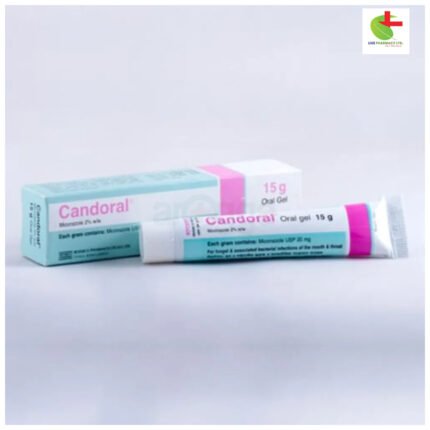Topirva 25
50.00৳ strip
- Topirva effectively manages epilepsy and prevents migraines.
- Used as primary and adjunctive treatment for various seizures, including generalized tonic-clonic and partial seizures.
- Helps reduce migraine attack frequency.
- Modulates brain activity through sodium channels, GABA-A receptors, and glutamate receptors.
- Consult a healthcare provider before starting or adjusting dosage.
 Brand
Brand
|
Incepta Pharmaceuticals Ltd |
|---|---|
 Generics
Generics
|
Topiramate |
 Type
Type
|
Tablet |
Indications
Epilepsy: Topirva is recommended for adults and children aged 6 years and older as a primary treatment for newly diagnosed epilepsy, including generalized tonic-clonic seizures and partial seizures, with or without secondary generalization. It is also used as an adjunctive treatment for individuals over 2 years old who have not achieved adequate control with standard first-line antiepileptic medications, including for partial seizures, Lennox-Gastaut Syndrome, and primary generalized tonic-clonic seizures.
Migraine: For adults, Topirva is used to prevent migraine headaches. Prophylactic treatment may be beneficial for those experiencing three or more migraine attacks per month or frequent migraines that significantly disrupt daily activities. Ongoing therapy should be evaluated every six months.
Pharmacology
Seizures result from abnormal, uncontrolled electrical discharges in the brain, leading to temporary interruptions in brain function, characterized by decreased alertness, unusual sensations, and involuntary movements or convulsions. Topirva’s precise mechanisms for treating seizures and migraines are not fully understood, but it likely influences multiple pathways. It affects voltage-dependent sodium channels, GABA-A receptors, and glutamate receptors.
Topirva enhances GABA-A receptor activity while inhibiting glutamate activity at AMPA and kainate receptors. This dual action helps decrease neuronal excitability, preventing both seizures and migraines. Additionally, Topirva blocks voltage-dependent sodium channels and inhibits certain carbonic anhydrase isozymes, although the latter’s clinical significance remains uncertain.
Dosage & Administration
Epilepsy – Monotherapy:
- Adults and Children Over 16 Years: Start with 25 mg nightly for one week, then increase by 25 or 50 mg/day every 1-2 weeks in two divided doses. The typical starting dose is 100 mg/day, with a maximum of 400 mg/day.
- Children Aged 6-16 Years: Begin with 0.5 to 1 mg/kg nightly for the first week, then increase by 0.5 to 1 mg/kg/day in two divided doses every 1-2 weeks. The usual target dose range is 3 to 6 mg/kg/day, with higher doses up to 16 mg/kg/day occasionally tolerated.
Epilepsy – Adjunctive Therapy:
- Adults and Children Over 16 Years: The minimum effective dose is 200 mg/day, with a typical range of 200 to 400 mg/day in two divided doses. Some may require up to 800 mg/day.
- Children Aged 2-16 Years: The recommended dose is 5 to 9 mg/kg/day in two divided doses. Start at 25 mg nightly, increasing by 1 to 3 mg/kg/day every 1-2 weeks as needed, up to 30 mg/kg/day.
Migraine:
- Adults and Children Over 16 Years: Start with 25 mg nightly for one week, then increase by 25 mg/day at weekly intervals. The typical dose for migraine prevention is 100 mg/day in two divided doses, though some may benefit from 50 mg/day.
Note: The use of Topirva for migraine prophylaxis in children under 16 years has not been studied.
Interactions
- Antiepileptic Drugs: Topirva generally does not affect the steady-state plasma concentrations of other antiepileptic drugs, except potentially increasing phenytoin levels.
- CNS Depressants: Use with caution with alcohol and other CNS depressants.
- Oral Contraceptives: Topirva may significantly increase the clearance of estrogen in oral contraceptives. Consider alternative non-hormonal contraception or formulations containing at least 50 μg of estrogen.
- Lithium: Monitor lithium levels carefully when used with Topirva, especially at higher doses.
- Hydrochlorothiazide (HCTZ): No significant impact on HCTZ pharmacokinetics, but combined use may lead to decreased serum potassium levels.
- Metformin: No significant effect on metformin pharmacokinetics, but Topirva may alter its clearance. Regular monitoring is advised.
- Pioglitazone and Glibenclamide: No significant effects on pharmacokinetics, but careful monitoring of diabetic control is necessary.
- Other Agents: Topirva may increase the risk of nephrolithiasis. Avoid other nephrolithiasis-predisposing agents.
Contraindications
- Hypersensitivity: Contraindicated in individuals with hypersensitivity to any component of Topirva.
Side Effects
Common: Nausea, abdominal pain, dyspepsia, diarrhea, dry mouth, taste disturbances, weight loss, anorexia, paresthesia, headache, fatigue, dizziness, speech disorders, drowsiness, insomnia, memory and concentration issues, anxiety, depression, visual disturbances.
Less Common: Suicidal thoughts, reduced sweetening (mainly in children), metabolic acidosis, alopecia.
Rare: Leukopenia, thrombocytopenia, serious skin reactions.
Pregnancy & Lactation
- Pregnancy: Topirva should only be used during pregnancy if the benefits outweigh the risks to the fetus.
- Lactation: Not recommended during breastfeeding.
Precautions & Warnings
Topirva should be tapered gradually to minimize the risk of seizures or increased seizure frequency. It may cause CNS-related adverse effects, including drowsiness and visual disturbances. Patients should avoid activities that require full alertness if affected.
Overdose Effects
In case of overdose, severe metabolic acidosis may occur. If ingestion is recent, induce emesis or perform gastric lavage. Activated charcoal can adsorb Topirva. Supportive care and hydration are essential. Hemodialysis is effective for Topirva removal.
Therapeutic Class
- Adjunctive antiepileptic drug.
Storage Conditions
Store below 30°C, away from light and moisture. Keep out of reach of children.













Reviews
There are no reviews yet.